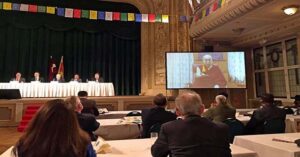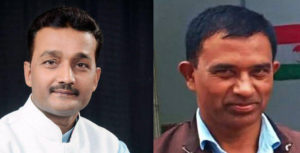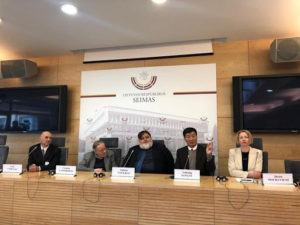
Lawmakers at the 7th World Parliamentarians’ Convention on Tibet listening to His Holiness the Dalai Lama’s video message
Photo: Tibetan Review
The 7th World Parliamentarian Convention on Tibet was held in Riga, Latvia from May 7 to 10. The conventions aims to “reinvigorate and galvanise global support for Tibet through concerted efforts and deliberations on the parliamentary front” reported tibet.net – the official site of the Central Tibetan Administration (CTA) based in Dharamshala. Parliamentarians and advocates from around the world who were attending reported on current methods of supporting Tibet and drew up a draft action plan for future engagement, including the Riga Declaration.
Going against their foreign policy agreement with China, two members of the Nepali parliament, Pradip Yadav and Iqabal Maya, attended, the Tibet Journal reported on May 14 from newspaper sources in Nepal. According to the Tibetan Review on May 15, both were visiting Latvia for personal reasons, although Maya admitted he attended the convention to support the Tibetan parliamentarians. It reported that neither sought consent to attend the convention from the Parliamentarian Secretariat, but it is also not clear if they were required to. The report also cites foreign affairs experts saying that it shows implementation of Nepal’s foreign policy is weak.

Pradip Yadav of the Samajbadi Party Nepal and Iqabal Miya of the Rastriya Janata Party-Nepal.
Photo: Tibetan Review
The convention, originally formed in 1994, was attended by around one hundred people and included 25 parliamentarians and advocates from 13 countries. His Holiness the 14th Dalai Lama addressed the convention at the start through a video message saying that his priorities are the protection of the Tibetan environment and the Tibetan language and culture. He explained that Tibetan is the best language with which to study ancient Indian knowledge, philosophy, psychology and also quantum physics.
Following the convention, on May 13, the Tibet Parliament reported on the United States Reciprocal Access to Tibet Act which was adopted as law last year; this provides for reciprocity of access to Tibet by tourists, journalists, diplomats and others. Mr Jonathan Stivers, Staff Director for Congressional Executive Commission on China, recommended at the convention that other countries implement similar Acts. He further recommended that parliamentarians make clear statements to support the governing of the Dalai Lama’s succession to His Holiness the Dalai Lama, Buddhists and the Tibetans.
The policies of the European Union (EU) on Tibet, and how the EU has maintained an agenda on human rights violations, were reported by Hon Csaba Sogar, MEP and Mr Vincent Metten, EU Policy Director of Europe International Campaign for Tibet. They presented the framework for EU-China dialogue and gave details of those that had taken place; putting forward their wishes for actions of the next EU parliament, due to be elected in July.
Following discussions, ideas for action were put forward and developed into a draft action plan. The Riga Declaration was drawn up and published on tibet.net. Some of the points included in the declaration are: serious concerns that the government of the PRC tried to pressure those attending the convention against doing so; the PRC’s refusal to enter into dialogue with representatives of the Dalai Lama since 2010; reiteration of the belief that a peaceful solution to the conflict is possible through negotiation; reaffirmation that prior to the invasion of China, Tibet was an independent country and that the annexation of Tibet by China in 1951 was illegal under international law; expression of solidarity with the Tibetan people’s non-violent struggle for their rights; condemnation of the assaults on Tibetan religion, culture and identity; concern for the Tibetan environment; reaffirmation that the Buddhist practice of appointing reincarnations of the Dalai Lama and Tulkus be solely a religious matter without the interference of political bodies.
The declaration calls on PRC to end the repression of Tibetans, to address the issues raised and to enter into peaceful negotiations. It also recognises that foreign parliamentary bodies can play a crucial role by putting pressure on China and by formulating and implementing policies to aid the Tibetan people.
More Representations in the EU
Prior to the convention, Dr Lobsang Sangay, President of the CTA, who was touring the Baltic region to raise awareness and gain support for Tibet, visited the Lithuanian parliament where he gave a press conference. This was strongly condemned by the Chinese embassy in Lithuania who called it “a serious political incident”.
Meanwhile Mr Kelsang Gyaltsen, His Holiness the Dalai Lama’s former envoy to Europe, spoke to the Committee on Human Rights and Humanitarian Aid on May 8 at a hearing, Religious Freedom: The human rights situation of religious minorities in China held by the German government. In his address he said that China wishes to eradicate Tibetan identity and disrespects international legal norms through its treatment of minority groups. He urged the German government to make a clear statement that they would not recognise any successive Dalai Lama appointed by the Chinese.





 Print
Print Email
Email